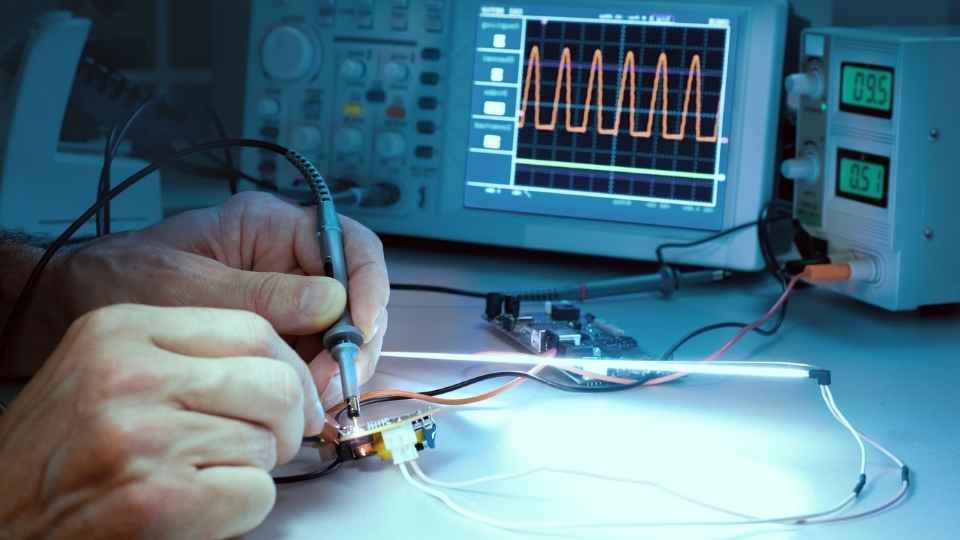
In the ever-evolving landscape of B2B electronics, market trends serve as the compass guiding sales engineers towards success. Like a skilled navigator charting a course through uncharted waters, these professionals must possess an astute understanding of the currents and tides that shape the industry.
From emerging technologies to shifting customer demands, staying ahead of the curve is essential for driving sales in this dynamic sector. In this article, we will explore how market trends are influencing electronics sales engineers and provide strategies for leveraging these trends to achieve lasting success.
Key Takeaways
- Businesses in the B2B electronics industry are driven by the need for innovation and meeting evolving customer needs.
- The surge in innovative technologies like IoT, AI, and blockchain is enabling seamless connectivity and automation in the industry.
- There is an increasing demand for smart devices as businesses seek to streamline operations and improve efficiency.
- The emphasis on sustainability is leading businesses to actively seek eco-friendly solutions to reduce their environmental impact.
Current Market Trends in B2B Electronics
The current market trends in B2B electronics are shaping the industry in several ways. One major impact is the drive for innovation, as businesses strive to stay ahead of the competition and meet the evolving needs of their customers. This has led to a surge in innovative technologies such as Internet of Things (IoT), artificial intelligence (AI), and blockchain that enable seamless connectivity and automation.
Another important trend is the increasing demand for smart devices. In today's fast-paced digital world, businesses are seeking ways to streamline their operations and improve efficiency. Smart devices offer solutions that enable businesses to gather and analyze data in real-time, leading to better decision-making and improved productivity.
Furthermore, there is a growing emphasis on sustainability in the B2B electronics industry. Businesses are actively seeking eco-friendly solutions for their operations, as they recognize the importance of reducing their environmental impact. This includes using energy-efficient devices, implementing recycling programs, and adopting sustainable manufacturing practices.
These market trends have created new opportunities for electronics sales engineers. They are now able to showcase their expertise in cutting-edge technologies and help businesses navigate this rapidly changing landscape. Electronics sales engineers play a pivotal role in driving adoption and facilitating successful implementation of these technological advancements within B2B industries.
Overall, the current market trends in B2B electronics are driving innovation, increasing demand for smart devices, and emphasizing the importance of sustainability. This presents both challenges and opportunities for businesses and professionals in the industry.

Impact of Market Trends on Electronics Sales Engineers
As market trends continue to evolve, professionals in the field of electronics sales engineering must adapt their strategies and approaches accordingly. The impact of these market trends on electronics sales engineers cannot be ignored, as it directly affects their ability to meet customer demands and stay ahead of the competition.
With the rapid advancements in technology, customers are becoming more knowledgeable and demanding when it comes to purchasing electronic products for their businesses. This means that sales engineers need to stay up-to-date with the latest industry developments, understand customer needs and preferences, and provide tailored solutions that meet those requirements.
By keeping a finger on the pulse of market trends, electronics sales engineers can position themselves as trusted advisors who can guide customers through the complexities of choosing the right electronic solutions for their business needs.
Transitioning into the next section about 'adapting to changing market dynamics in b2b electronics', it is crucial for electronics sales engineers to recognize that adapting to these changing market dynamics is not an option but a necessity for long-term success in this competitive industry.
Adapting to Changing Market Dynamics in B2B Electronics
As the B2B electronics market continues to evolve, it is crucial for companies to adapt to changing market dynamics in order to stay competitive.
This requires a deep understanding of customer demands and the ability to effectively meet those demands.
Staying Competitive Amidst Changes
To maintain a competitive edge amidst industry changes, electronics companies must continually adapt their strategies and offerings. In today's fast-paced market, staying ahead requires an in-depth understanding of customer needs and the ability to deliver innovative solutions.

As new technologies emerge and customer preferences evolve, it is crucial for electronics companies to stay on top of these trends. This means investing in research and development to create cutting-edge products that meet the changing demands of consumers.
Additionally, companies must also focus on building strong relationships with their customers by providing exceptional service and support. By doing so, they can position themselves as trusted partners who not only provide high-quality products but also offer valuable insights and expertise.
With the right approach, electronics companies can navigate through industry changes and continue to thrive in this dynamic landscape.
Meeting Customer Demands Effectively
Efficiently meeting customer demands is essential for companies in the electronics industry to remain competitive and ensure long-term success.
In today's fast-paced market, customers have high expectations when it comes to product quality, customization options, and quick delivery. To effectively meet these demands, companies must invest in advanced manufacturing technologies that enable rapid production cycles and flexible customization capabilities.
Additionally, implementing efficient supply chain management systems can help streamline processes and reduce lead times. By leveraging data analytics and artificial intelligence technologies, companies can gain valuable insights into customer preferences and behavior, allowing them to anticipate demand patterns and proactively adjust their production strategies.
Furthermore, fostering strong relationships with customers through exceptional customer service is crucial in building loyalty and repeat business.

Overall, by prioritizing efficiency in meeting customer demands, companies can not only stay competitive but also create a loyal customer base that drives long-term success.
Strategies for Success in a Dynamic Electronics Market
In order to thrive in a dynamic electronics market, companies must adapt their strategies for success. Here are three key strategies that can help businesses stay ahead of the competition and achieve growth:
Embrace innovation: The electronics industry is constantly evolving, with new technologies and trends emerging at a rapid pace. Companies need to invest in research and development to stay at the forefront of innovation. This means developing new products, improving existing ones, and exploring partnerships with other industry leaders.
Focus on customer experience: In today's digital age, customers have more choices than ever before. To stand out from the competition, companies must prioritize delivering an exceptional customer experience. This includes providing personalized solutions, offering excellent after-sales support, and leveraging technology to enhance the overall buying process.
Build strong partnerships: Collaboration is crucial in the electronics market. By partnering with suppliers, distributors, and other stakeholders, companies can gain access to new markets and resources. Strong partnerships also enable businesses to share knowledge and expertise, ultimately leading to better products and services.
Leveraging Market Trends to Drive Sales in B2B Electronics
In today's fast-paced and ever-changing business landscape, staying ahead of market trends is crucial for success in the B2B electronics industry. As an electronics sales engineer, it is imperative to leverage these trends to drive sales and maintain a competitive edge. By understanding the evolving needs and preferences of customers, you can tailor your product offerings and marketing strategies accordingly.
One key trend shaping the B2B electronics market is the increasing demand for IoT (Internet of Things) devices. Businesses across industries are embracing IoT solutions to improve operational efficiency and gain valuable insights from data analytics. By aligning your product portfolio with this trend, you can position yourself as a trusted provider of innovative IoT solutions.

Another important trend to capitalize on is sustainability. With growing environmental concerns, businesses are actively seeking eco-friendly products that reduce their carbon footprint. By offering energy-efficient and sustainable electronics solutions, you can tap into this market segment and attract environmentally conscious customers.
As technology continues to advance at an unprecedented pace, it is essential to stay informed about emerging technologies such as 5G connectivity, artificial intelligence (AI), and blockchain. These technologies have the potential to revolutionize various industries, creating new opportunities for B2B electronics sales.
By leveraging market trends effectively, you can not only meet customer expectations but also gain a competitive advantage over your peers in the B2B electronics industry.
Transition:
To navigate the future of B2B electronics sales successfully...
Navigating the Future of B2B Electronics Sales
To successfully navigate the future of B2B electronics sales, it is crucial for professionals in this industry to embrace emerging technologies and adapt their strategies accordingly. The rapid advancement of technology has significantly impacted the way businesses operate, and the electronics industry is no exception.
Here are three key areas where professionals can focus their efforts to stay ahead in this ever-evolving landscape:

Embrace digital transformation: Adopting digital tools and platforms can streamline processes, improve efficiency, and enhance customer experiences.
Leverage data analytics: Utilizing data-driven insights can help identify trends, understand customer preferences, and make informed business decisions.
Invest in IoT solutions: The Internet of Things (IoT) offers immense potential for B2B electronics sales by connecting devices and enabling remote monitoring, predictive maintenance, and real-time data analysis.
Frequently Asked Questions
How Do Market Trends in B2B Electronics Impact the Overall Industry Growth?
Market trends in B2B electronics significantly impact the overall industry growth. Understanding these trends, such as increasing demand for IoT devices and advancements in artificial intelligence, enables businesses to stay competitive and meet evolving customer needs.
What Are the Key Skills and Qualifications Required for Electronics Sales Engineers to Successfully Adapt to Changing Market Dynamics?
The key skills and qualifications required for electronics sales engineers to successfully adapt to changing market dynamics include strong technical knowledge, excellent communication and negotiation skills, a deep understanding of customer needs, and the ability to analyze market trends and develop effective strategies.
What Are Some Effective Strategies for Electronics Sales Engineers to Navigate and Succeed in a Dynamic Electronics Market?
To navigate and succeed in a dynamic electronics market, effective strategies for electronics sales engineers include staying updated with market trends, building strong relationships with clients, offering customized solutions, and continuously enhancing technical knowledge.
How Can Electronics Sales Engineers Leverage Market Trends to Drive Sales and Stay Competitive in the B2B Electronics Industry?
To stay competitive in the B2B electronics industry, sales engineers can leverage market trends by actively monitoring and analyzing customer demands, adapting their product offerings, and continuously improving their knowledge of emerging technologies.

What Are the Potential Challenges and Opportunities That the Future Holds for B2B Electronics Sales, and How Can Sales Engineers Navigate Them Effectively?
The future of b2b electronics sales poses both challenges and opportunities. Sales engineers must navigate emerging technologies, changing customer demands, and global competition to drive sales effectively.
 Basic Electronics ConceptsEssential ToolsCircuit Design BasicsMicrocontrollersDIY Electronics ProjectsRoboticsPrivacy PolicyTerms And Conditions
Basic Electronics ConceptsEssential ToolsCircuit Design BasicsMicrocontrollersDIY Electronics ProjectsRoboticsPrivacy PolicyTerms And Conditions
